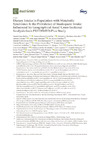Identificador persistente para citar o vincular este elemento:
https://accedacris.ulpgc.es/jspui/handle/10553/44594
| Título: | Dietary intake in population with metabolic syndrome: Is the prevalence of inadequate intake influenced by geographical area? Cross-sectional analysis from PREDIMED-plus study | Autores/as: | Cano-Ibáñez, Naomi Bueno-Cavanillas, Aurora Martínez-González, Miguel A. Corella, Dolores Salas-Salvadó, Jordi Zomeño, M. Dolors García-De-La-Hera, Manoli Romaguera, Dora Martínez, J. Alfredo Barón-López, F. Javier García-Ríos, Antonio Estruch, Ramón García-Molina, Laura Gómez, Ángel Alonso Tur, Josep A. Tinahones, Francisco Serra-Majem, Lluis Cubelos-Fernández, Naiara Lapetra, José Vázquez, Clotilde Pintó, Xavier Vidal, Josep Daimiel, Lidia Gaforio, José Juan Matía, Pilar Ros, Emilio Diez-Espino, Javier Fernández-Carrión, Rebeca Basora, Josep Fitó, Montse Zazo, Juan Manuel Colom, Antoni Toledo, Estefanía Díaz-López, Andrés Muñoz, Miguel Ángel Ruiz-Canela, Miguel Gea, Alfredo |
Clasificación UNESCO: | 3206 Ciencias de la nutrición | Palabras clave: | Physical-Activity Questionnaire Mediterranean Diet Cardiovascular-Disease Older-Adults Risk-Factors, et al. |
Fecha de publicación: | 2018 | Proyectos: | Efecto de la Dieta Mediterránea Hopocalórica y Promoción de la Actividad Física en Prevención Primaria Cardiovascular.Estudio Piloto Sobre Marcadores Intermedios. Efecto de Una Pérdida de Peso Con Dieta Mediterránea Hipocalórica y Promoción de la Actividad Física en la Prevención Primaria Cardiovascular |
Publicación seriada: | Nutrients | Resumen: | Inadequate diet influences chronic diseases such as cardiovascular disease (CVD), the leading cause of death in Spain. CVD figures vary from one geographical region to another; this could be associated with different food choices. Our aim was to analyse the influence of geographical area on nutrient intakes among the Spanish adult population with Metabolic Syndrome (MetS). We analysed cross-sectional baseline data from the PREDIMED-Plus study: 6646 Spanish adults, aged 55-75 years, with overweight/obesity and MetS in four geographical areas. A validated 143-item Food Frequency Questionnaire (FFQ) was used to assess energy and nutrient intakes. The prevalence of inadequate nutrient intake was estimated according to Dietary Reference Intakes (DRIs). Multivariable-adjusted logistic regression was used to assess the relationship between geographical area (North, Central, East and South areas) and inadequate nutrient intake. People in the North area consumed significantly lower amounts of vegetables and fish but more sugar and alcohol (p < 0.001) than other areas. Dietary fibre, vitamin A, E, calcium and magnesium intakes were all lower among men of North area than in the other areas (p < 0.001). Sex (women), non-smoker and physical activity were also associated to adequate nutrient intake. Geographical area influences nutrient intakes. Its effect on dietary quality should be taken into account when planning food policies. | URI: | https://accedacris.ulpgc.es/handle/10553/44594 | ISSN: | 2072-6643 | DOI: | 10.3390/nu10111661 | Fuente: | Nutrients [ISSN 2072-6643], v. 10 (11), 1661, (Noviembre 2018) |
| Colección: | Artículos |
Citas SCOPUSTM
9
actualizado el 08-jun-2025
Citas de WEB OF SCIENCETM
Citations
8
actualizado el 22-feb-2026
Visitas 10
207
actualizado el 27-sep-2025
Descargas
24
actualizado el 27-sep-2025
Google ScholarTM
Verifica
Altmetric
Comparte
Exporta metadatos
Los elementos en ULPGC accedaCRIS están protegidos por derechos de autor con todos los derechos reservados, a menos que se indique lo contrario.
